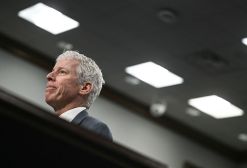How one national lab is opening up code without compromising national security


(Getty Images)
National security and open source are not usually paired together in the same sentence. But a national lab with work often entangled in national security-driven protocol and export control laws is embracing open source, said Ian Lee, a computer engineer at Lawrence Livermore National Laboratory.
Lee is leading some of those laboratory efforts, and in an interview with FedScoop he discussed that journey in advance of a talk Wednesday at the GitHub Universe conference.
The greatest benefits of open source, Lee told FedScoop, “are the collaboration and the communities that grow up around these projects.”
And indeed, the laboratory can contribute to the community insights it gains developing on the scale it does with its extensive computing infrastructure, Lee said. Universities, other laboratories and supercomputing facilities around the world have found their work useful, Lee said.
As an example, Lee pointed to laboratory work on an open source job scheduler for scheduling computing jobs on a system with multiple users.
“We are in the process of changing even to support that open source culture,” Lee said, “to support the processes for developers to work on these sorts of projects for these very fundamental computer science projects, for fundamental even natural science, and physical science projects… that are not things that are classified.”
Lee was spurred into action after seeing former 18F staffer Jackie Kazil speak last year at a conference, he said. He started looking around in October at what his laboratory was doing, and noticed that while several people had been involved in open source work for awhile, there was not a consolidated approach to move in that direction.
For the past year, Lee has been helping the laboratory consolidate its open source efforts in one place.
The software portal makes the lab’s open source work more easily accessible, builds community and allows the laboratory to better manage its code, Lee said. He said it is particularly helpful for project continuity.
“Once the status of an employee who’s working on a project changes, there’s someone ready who can continue maintaining that project,” he noted, “which was something that was more difficult earlier on when projects were hosted in various different places across the internet.”
Consolidating laboratory efforts has been going very well, he said, but there are still speed bumps on the way to developing more work in the open.
“Moving forward to where more people are encouraged and able to actually contribute has been I would say, the biggest challenge,” Lee said. “So there the issue has been that we have requirements to make sure that the work that we’re doing doesn’t violate any sort of export control issues, or classification issues, because that is a big core piece of what we do here internally.”
Much of Lee’s work is making sure everyone is on the same page when it comes to what is possible to do in open source, including helping some developers transition older projects. In that work, Lee has hosted training courses for people who may have been using very old version control systems.
“The average age is actually quite high, especially compared to many other parts of the Bay Area,” Lee said of the lab’s developers and some other staff. “And so some of the processes that have been being used for some of these codes, that in some cases have been around for 10, 20, 30 years, have not necessarily kept up with what’s happening in the outside world. And they haven’t necessarily needed to.”
While new projects are springing up in the laboratory, he noted it’s been harder for some of the older projects to make the move.
“What I’ve been able to do is go work with them to transition over, to leverage capabilities like what GitHub provides through their APIs and through their dashboard visualizations,” Lee said.
Lee’s advice to others looking to do the same kind of work in their own organizations was to be patient and keep working at it. He also noted that while there is a perception that government moves slower than industry, “processes can be changed.”
He pointed to successes in his own laboratory and in other laboratories, as well as policy changes like the recently finalized White House’s Office of Management and Budget open source code policy.
[Read more: OMB finalizes policy on open source code from agencies]
“I think they’re huge steps that are going to move us forward,” he said.






